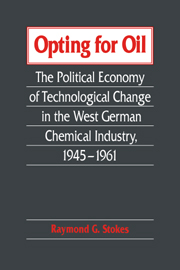Book contents
- Frontmatter
- Contents
- Preface
- Introduction
- Part I Background
- Part II Bargaining from strength: the political economy of technological change, 1949–1955
- Part III Alternative paths to plenty: case studies from the mid–1950s
- Part IV Consolidating the new regime, 1957–1961
- 10 Petrochemicals triumphant, 1957–1961
- 11 Conclusion
- Index
11 - Conclusion
Published online by Cambridge University Press: 19 October 2009
- Frontmatter
- Contents
- Preface
- Introduction
- Part I Background
- Part II Bargaining from strength: the political economy of technological change, 1949–1955
- Part III Alternative paths to plenty: case studies from the mid–1950s
- Part IV Consolidating the new regime, 1957–1961
- 10 Petrochemicals triumphant, 1957–1961
- 11 Conclusion
- Index
Summary
Between 1945 and 1961, West German chemical producers dramatically increased their reliance on oil. At the beginning of that period, coal was the basis for almost all organic chemical production. By 1961, over half of it came from petroleum-based feedstocks. That trend continued during the following decade, until by the early 1980s virtually all organic chemical products were made from petroleum or natural gas. Full participation by West German firms in the technological transformation of the international chemical industry was a key factor in West Germany's remarkable economic success from the 1950s to the present.
One might imagine that the change from coal-based to petroleum-based chemical production was inevitable. Petroleum and its derivatives were, after all, far less expensive than coal and its products; petrochemicals also allowed economies of scale in the production of chemicals far beyond those offered by coal-based chemistry. On the basis of those facts, one might argue that it was inevitable that in the long run the less expensive feedstock and the superior technology would prevail in West Germany just as they had in the organic chemical industry around the world.
But to accept that intuitively plausible explanation would be unfortunate, for at least two reasons. First, that explanation would convey a false impression of the course of technological change in the West German chemical industry during the postwar period.
- Type
- Chapter
- Information
- Opting for OilThe Political Economy of Technological Change in the West German Industry, 1945–1961, pp. 244 - 252Publisher: Cambridge University PressPrint publication year: 1994



